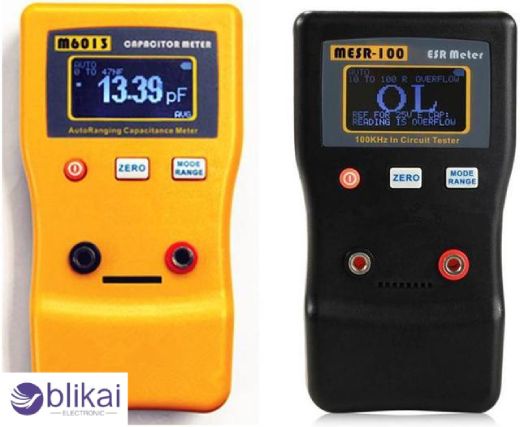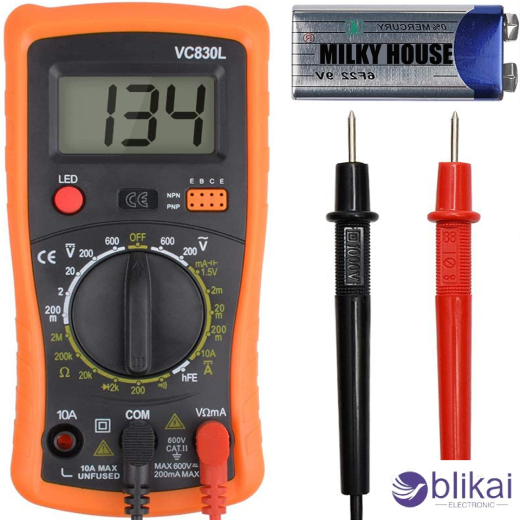Capacitor Tester: Types, Applications & Advantages
What is a Capacitor Tester?
An outfit known as a capacitor tester is used to measure a capacitor's capacitance as well as, sometimes, its original series resistance(ESR) and leakage current. For testing capacitors in circuits or as stage-alone factors, electronics workers, masterminds, and suckers can not go to be without capacitor testers.

Types of capacitor testers
1. Digital Multimeter with Capacitance Function:
Current digital multimeters (DMMs) come with a lot of capacitance measurement features. These functions are convenient for basic capacitance measurements, but some may not offer ESR or leakage testing. Therefore, leakage testing requires other types of testers.

2. LCR Meters:
Resistance(R), capacitance(C), and inductance(L) can all be measured with LCR measures. Compared to conventional multimeters, these measures are more accurate. These meters are more sophisticated and adaptable than other testers because they can also provide additional characteristics like ESR.
3. Dedicated ESR Meters:
Capacitor equivalent series resistance (ESR) measurement is the area of expertise for ESR meters. This is very helpful when evaluating capacitors because high ESR values could point to a problem.
4. Capacitance Meters:
These are standalone devices specifically designed to measure the capacitance of capacitors. They provide more precise readings and sometimes additional features, like leakage current testing.
5. Component Analyzers:
Component analyzers, such as the ones made by companies like Peak Electronic Design (e.g., Atlas ESR70), offer comprehensive testing capabilities for various components, including capacitors. They often provide data on capacitance, ESR, leakage current, and even a basic indication of capacitor health.
Key Features to Consider:
-Measurement Range: The range of capacitance and ESR that the tester can measure.
-Accuracy and Resolution: Higher precision tools are needed for more sensitive or critical applications.
-Ease of Use: Some testers provide a simple interface, while others might require more setup.
-Display: For reading, a bright, backlit display is essential. Particularly under different lighting circumstances.
-Portability: Field-ready models that are portable. Laboratory settings are better suited for benchtop models.
Applications of Capacitor Testers
- Electronics Repair and Troubleshooting
- Automotive Electronics Maintenance
- Industrial Equipment Maintenance
- Telecommunications
- Aerospace and Defense
- Medical Equipment Maintenance
- Quality Control in Capacitor Manufacturing
- Research and Development
- Energy Sector
- Power Supply Design and Testing
- Circuit Design Optimization
- Education and Training
- Home Appliance Repair
- PCB Assembly Testing
- Audio Equipment Testing
- Preventive Maintenance in Critical Systems
- Capacitor Bank Testing in Power Grids
- Testing Electrolytic Capacitors for Aging and Leakage
- Testing High-Voltage Capacitors
Advantages of Using Capacitor Testers
Using capacitor testers offers several advantages across various fields and applications. Here are some of the key benefits:
1. Accurate Diagnosis of Capacitor Health:
Capacitance can be measured with a capacitance tester. It goes without saying that determining the leakage current, original series resistance(ESR), and other factors are helpful in precisely determining the capacitor's state. This aids in locating worn-eschewal or damaged capacitors, which could affect in a circuit failure.
2. Prevents Equipment Failure:
Frequent testing of capacitors aids in the early detection of potential faults, particularly in essential systems including industrial machinery, power supply, and medical equipment. This preventive strategy lowers unexpected downtime and expensive repairs.
3. Improved Troubleshooting Efficiency:
Faulty capacitors can be easily found and replaced by technicians. When fixing electrical equipment, it is extremely helpful to expedite the repair process. Testing several capacitors could be necessary for this.
4. Versatility in Testing Capacitors and Other Components:
Capacitors, inductors, and resistors can all be tested with sophisticated test tools like LCR meters and impedance analyzers. This makes them versatile tools in electronics design, testing, and repair environments.
5. In-Circuit Testing Capability:
A Few Testers of Capacitors ESR meters in particular are capable of testing capacitors without turning them off. By doing this, you can desolder boards or components more quickly and with less chance of damage.
6. Enhanced Quality Control in Manufacturing:
Prior to production, manufacturers have the ability to verify that capacitors fulfill all necessary criteria. Defects are decreased, and product quality is raised. Capacitor series testing during manufacturing aids in preventing the release of faulty goods onto the market.
7. Cost-Effective Maintenance:
The capacitor tester can assist prevent costly repairs or replacements by identifying malfunctioning capacitors at an early stage. This may result in financial savings. This is especially helpful for sectors of the economy where major losses might result from equipment failure.
8. Extends Equipment Lifespan:
Electronic equipment can have its lifespan increased with routine capacitor testing and replacement. Severe mistakes that can harm additional components are avoided.
9. Improved Reliability in Critical Applications:
Reliability and safety depend on the integrity of capacitors in vital systems like data centers, medical equipment, airplanes, and telecommunications. Capacitor testers help maintain these standards.
10. Optimizes Circuit Performance:
Analog circuits, power supplies, filters, and oscillators operate better when accurate measurements of capacitors and ESRs are made during the circuit design and development process.
11. User-Friendly Operation:
Both beginners and specialists can use this contemporary digital capacitance cadence and ESR cadence thanks to its user-friendly interface and easy-to-read display.
12. Suitable for a Wide Range of Capacitor Types:
Multitudinous capacitor types can be measured by the capacitor tester. It's helpful in a range of operations because it includes tantalum, film, ceramic, electrolytic, and supercapacitor capacitors.
13. Portable and Convenient:
Numerous tests for capacitors are battery-operated and portable. This makes it simple to utilize in the field and conduct on-site testing in various settings. from homes to commercial buildings.
14. Educational and Training Value:
With the use of capacitor testers, electronics suckers and scholars can learn about capacitor geste , testing methodologies, and the impact of ESR and capacitance on circuit performance.
15. Data Logging and Analysis:
In-depth data analysis and data recording are provided by sophisticated capacitor testers and impedance analyzers for research, development, and failure analysis, as well as improved design and optimization.
16. Reduced Downtime in Industrial and Commercial Settings:
In factories, data centers, and commercial buildings, timely testing of capacitors during preventative maintenance procedures can save downtime and avert sudden failures.
How Does a Capacitor Tester Work?
The process of charging and discharging a capacitor powers a capacitor tester. The capacitance value is caught on by measuring the response. In order to assess the quality of the capacitor, some testers farther measure the original series resistance, or ESR.
What is ESR (Equivalent Series Resistance), and Why is it Important?
A capacitor's internal resistance is measured using an ESR. It matters because a high ESR could point to a malfunctioning capacitor. This is particularly true for circuits involving power supplies, where efficiency depends on having a low ESR.
Can a Capacitor Tester Be Used In-Circuit?
Certain capacitance testers can measure capacitors in a circuit without the need for desoldering. However, other circuit components could have an impact on the results for more precise readings. A disconnect should be used while testing capacitors.
What Safety Precautions Should Be Taken When Using a Capacitor Tester?
-Prior to testing, confirm that the capacitor has been fully discharged. Avoid harming or damaging the tester.
-Comply with the manufacturer's recommendations for usage and voltage limitations.
-In high voltage operations, make use of safety measures and insulated tools when testing capacitors.
What Are the Benefits of Using a Digital Capacitor Tester Over an Analog One?
Readouts from digital capacitor testers are more precise. Compared to analog testers, they frequently include more features, such ESR readings, and are simpler to read.
Can Capacitor Testers Test Other Components?
Some advanced models can test other components, such as resistors, diodes, inductors, and transistors. However, basic models are generally limited to capacitance and ESR measurements.
Related Articles
How to Test a Capacitor: Simple Steps and Tools
How to Test a Capacitor with a Multimeter [Guide]
Variable Capacitors: A Complete Guide
How to Test a Hard Start Capacitor [Complete Guide]
How to Charge Capacitor Without Resistor?
Capacitor vs Resistor: What's the Differences?
AC Capacitor Keeps Blowing: What to Do Next?
Battery Testers: What You Should Know!
Types of Industrial Control Systems: Everything Explained
The Transmission System and Its Function
Capacitors in Series Calculator: Everything Explained
What is Power Capacitor? All Explained
How to Test a Capacitor: Simple Steps and Tools
Unveiling Polypropylene Capacitors: Principles, Applications, and Future Trends










